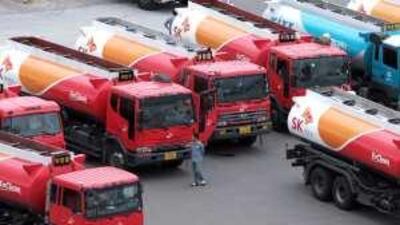The second-largest market for Abu Dhabi crude oil is likely to shrink in coming years as South Korean oil refiners weigh the closure of older, less-efficient plants, Korean industry executives and experts say. For years, Korean refiners have raked in profits by processing huge volumes of oil, mainly from the UAE and other Gulf states, and exporting much of the production to other Asian markets, primarily China.
But stiff competition from new refineries in China, India and the Middle East have made exports uneconomical, said Chang Jihak, the senior vice president for crude oil and trading at Hyundai Oil Bank, the country's fourth-largest refiner. "As the new Chinese and Indian systems are on stream, it's very difficult to get a margin on exporting petro-products overseas," he said at the company's headquarters in Seoul. "The margin from the domestic market is relatively better than the overseas exporting margin; we are managing our business with the domestic demand."
The country's four major refiners have capacity to process more than 2.8 million barrels per day (bpd) of crude oil, but less than 2 million bpd is consumed by the domestic market. The surplus capacity, which once made South Korea Asia's largest exporter of oil products, is mostly idle and at risk of being closed down if poor conditions persist, Mr Chang said. Hyundai Oil Bank is processing about 320,000 bpd, he said, of which about a third is exported to China and other Asian markets. Seventy per cent of the company is held by International Petroleum Investment Company, an energy investment fund owned by the Abu Dhabi Government.
The competition from overseas refiners has coincided with a general downturn in the industry globally. For much of last year, refineries barely broke even on each barrel of oil they processed into diesel, petrol and other products, Mr Chang said. "There's not much we can do to cope with such a bad situation." Fourth-quarter net profits at SK Energy, the country's largest refiner, fell 22.3 per cent compared with the same period in 2008 because of narrowing margins, the company reported last week.
South Korean refiners "have not had an easy few years" and could be forced to reduce costs by closing older plants, said Tom Grieder, the Asia Pacific analyst for IHS Global Insight, an energy consultancy. "If the margin situation does not improve over the coming year, then retiring older units could help to bring down maintenance costs," he said. "Refiners' future competitiveness in the market will depend on producing high quality products at low cost through upgraded and efficient units."
The country's oldest refinery at Incheon is the likeliest to close, experts say, because its small quay cannot accommodate the world's largest oil tankers and it lacks sophisticated technology to maximise yields. The plant has a capacity of 275,000 bpd. But the country's oldest plants may be competitive enough to avoid closing down, said John Vautrain, a senior vice president at Purvin and Gertz, a refining consultancy.
"I expect the Korean refiners may reduce rates but I believe they are superior to the threshold required for continued operation longer term," he said. OPEC last year forecast "flat to declining demand" through to 2030 for refineries in the Pacific industrialised nations, including Korea, Japan, Australia and New Zealand, "with no new refinery capacity needed". Abu Dhabi exported more than 15.3 million tonnes of crude oil to South Korea last year, which works out to almost 310,000 bpd and made up 13.5 per cent of the country's imports, the Korean government reports. Total imports were 113.7 million tonnes.
South Korea is Abu Dhabi's second-largest oil market after Japan, and the UAE capital is Korea's second-largest oil supplier, after Saudi Arabia. @Email:cstanton@thenational.ae

